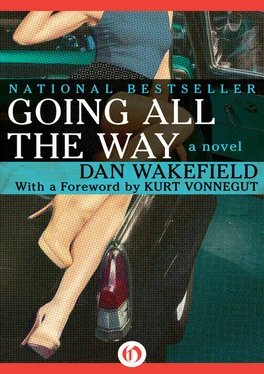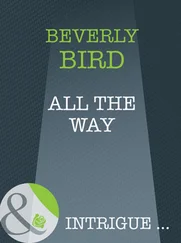“How are you?” Buddie asked him.
“O.K. Just fine.”
“I’m glad. When you get back home, I can drive you around—I mean, if you want to go someplace.”
“O.K.”
“I love you.”
“O.K.”
Finally his mother and father came back and they were all uncomfortable together, which was better than just him and Buddie being uncomfortable alone. The nurses later kidded him about having a girl friend, and that made him a little glad Buddie had come, anyway; it raised his stock with the nurses, being a guy who had a girl that came to visit.
It got to be autumn, the clean time. The old hot sticky life of summer cooled down, the wet lush bursting leaves curled into rich golds and reds and browns, falling, lazily, gathering for pyres that would turn to fire and drifting smoke, signals of summer-end, of possible crisp beginnings. Sonny asked Mrs. Garraty to keep the windows open. He wanted to breathe it, the healthy invigorating chill that cleared the hot lungs and the stuffed-up mind. Mrs. Garraty, Jean, his daytime nurse. With her long straight chestnut hair and madonna smile. Married to a potter, an artist, no doubt a sensitive guy, a guy who had a hard time of it. Maybe he would die of some artistic disease and Sonny would get to marry Mrs. Garraty and adopt her two little kids and they would all live happily ever after, in some perpetual autumn of peace and drifting smoke. If the Bomb came, they wouldn’t even try to hide. They would sit in a circle on the front lawn, holding hands and smiling and letting it come. That way you wouldn’t run all the time till it happened by worrying about it, wondering when it would be and what you would do. That’s what the papers meant by “living under the shadow of the Bomb.” Fuck that shadow. There were too many shadows you lived under anyway.
Finally they took Sonny out of the traction contraption and put him in a body cast that came down to his waist and came up over his head, just leaving his face out and cutting away a part so his ears were free. At first it was hot and tight and Sonny was scared shitless he’d never be able to live in it, even for the two months they said he had to before he got a regular neck brace instead of the plaster, but then after a couple days he began to get used to it. Maybe you could get used to anything if you had to, sleeping on nails or any damn thing.
Sonny got to practice starting to walk. His legs were weak from not being used and he had to work them back into practice. First he just walked around his room and then he got to go up and down the halls. He was something of a special attraction in his weird cast, and he found he was able to be more friendly to people than he ever had been in his life. He stopped and visited with people confined to their bed, told stories, entertained the nurses, played with little kids who were visiting sick relatives. He was such a popular guy in the cast he wondered if maybe he shouldn’t keep it on for good. Maybe he could wear it to New York and get a job in a nightclub or something—stories and songs by The Man in the Cast! Everyone would love him.
On one of the clear autumn days that smelled of a special crisp poignance, Sonny secretly got dressed. He usually made his rounds up the halls wearing his terrycloth bathrobe, but this time he got out some clothes from the suitcase his parents had brought for when he was ready to use them. He put on a shirt, even though the cast was so big he could only button it up about halfway, and some old corduroy pants, and his shoes and socks, and a raincoat that he bundled up around him, pulling the collar up, hiding as much of the cast as he could, and he snuck downstairs and went across the street to a little diner. It was a nice old-fashioned sort of place with frying smells and a counter with stools, and pieces of pie underneath a glass case. Pumpkin pie, his favorite, was in season now, and Sonny had a piece of that and a cup of coffee. The pie was soft and soothing, and the hot coffee invigorating. He couldn’t remember when he ever enjoyed eating anything so much. Maybe because it occurred to him that he might have never again been able to eat a piece of pumpkin pie if he’d snapped his neck a little further.
Outside he stood for a while on the sidewalk, just breathing deeply and feeling the pleasure of being alive in the fall. A sharp breeze tingled his flesh and made his eyes get a little watery, and when he blinked and opened them, it seemed for a moment as if everything was bathed in a soft gold light, like a blessing. It was just for a moment but it gave Sonny a sudden sense of joy that seemed to spread through his whole being. He had known those moments before, in different times and places, and they had seemed so intense and so real that everything else was like sleep. Such moments made you feel completely alive, reminded you of being alive, and Sonny wondered if perhaps that’s what “real life” was after all—those moments. He didn’t find it depressing, but felt perhaps it meant that his real life had been going on all the time, that the moments were to remind him of it and let him feel it. He figured the truth was maybe you lived hundreds of lives within your time, that you never started and continued on a straight path that kept going higher but that you got lost, crashed into things, were crashed into, and began again. There wasn’t any last beginning until death did away with you or took you away to some other place. He didn’t know about what happened then or even care much at the moment, but he did have a sense of what he was doing now, doing again, as he planned for New York, as he broke from home; whether it was smart or dumb, good or bad, to do those things, he knew at least in one way what he now was doing and was going to continue to do in different ways and in different places and with different people, as long as his heart beat and his blood ran, until he came to this life’s end:
Begin.
Dan Wakefield (b. 1932) is the author of the bestselling novels Going All the Way and Starting Over , which were both adapted into feature films. His memoirs include New York in the Fifties , which was made into a documentary film of the same name, and Returning: A Spiritual Journey , praised by Bill Moyers as “one of the most important memoirs of the spirit I have ever read.” Wakefield created the NBC prime time series James at 15 , and wrote the screenplay for Going All the Way , starring Ben Affleck. He edited and wrote the introduction for Kurt Vonnegut Letters as well as If This Isn’t Nice, What Is?: Vonnegut’s Advice to the Young.
Visit Wakefield online at www.danwakefield.com and www.vonnegutsoldestlivingfriend.com.
Ebooks By Dan Wakefield
FROM OPEN ROAD MEDIA
























